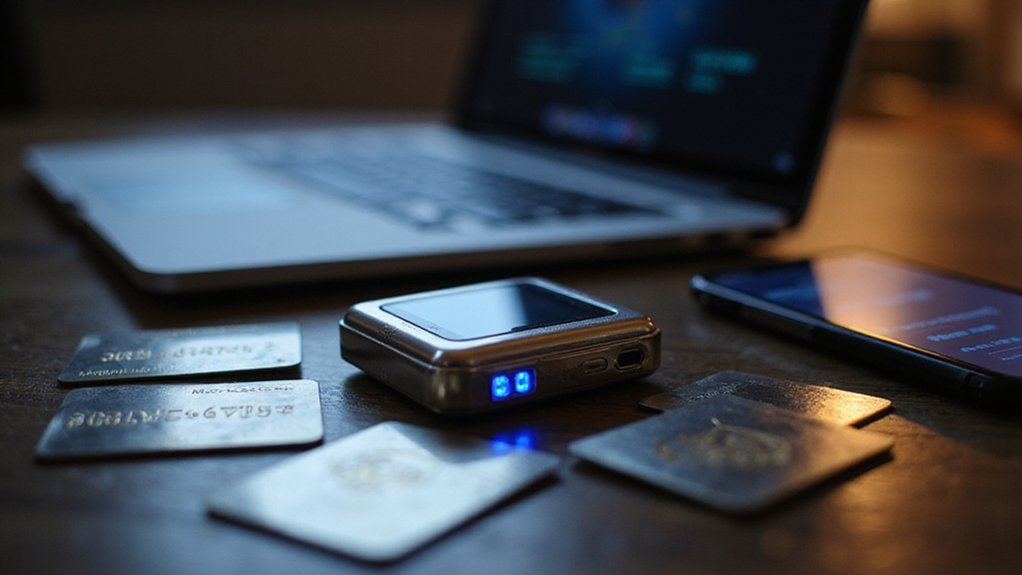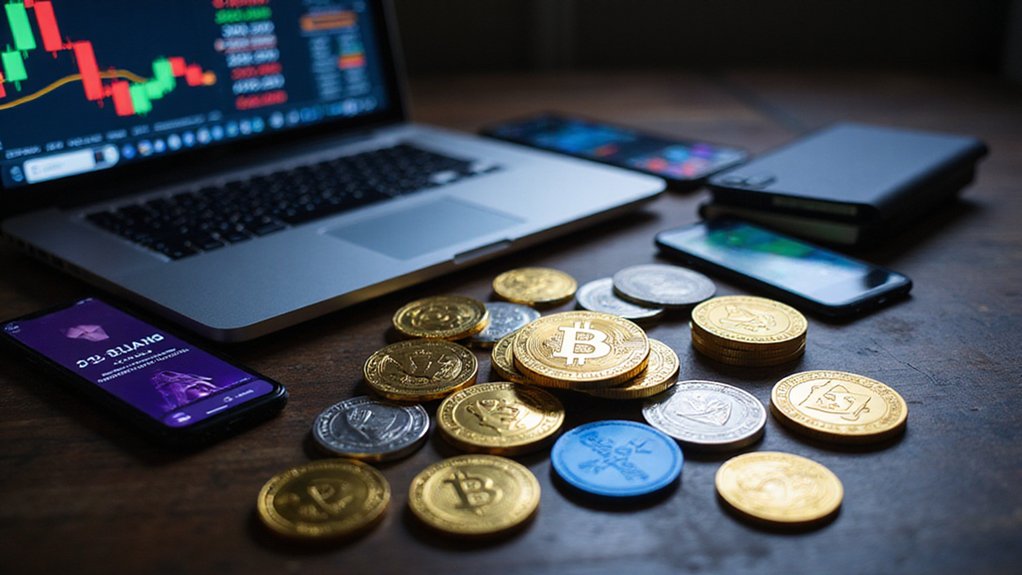Cryptocurrency security demands exponentially more sophisticated protocols than traditional investments, yet investors routinely exhibit casual indifference toward protecting digital assets worth thousands. Hardware wallets like Ledger and Trezor store private keys offline, while reputable exchanges require insurance coverage and regulatory compliance—luxuries absent in crypto’s regulatory Wild West. Multi-factor authentication, meticulous transaction logging, and avoiding public Wi-Fi constitute baseline security measures. Understanding these fundamentals reveals why professional-grade protection strategies become absolutely essential.

Why do investors who meticulously research traditional securities often treat cryptocurrency storage with the same casual indifference they reserve for leaving car keys on a coffee shop table?
The phenomenon defies logic, particularly when digital assets require exponentially more sophisticated security protocols than conventional investments.
Exchange selection demands the same due diligence applied to brokerage evaluation—perhaps more, given the regulatory Wild West that characterizes much of the crypto landscape.
Credible exchanges demonstrate verifiable histories free from catastrophic breaches, maintain AML/KYC compliance (though definitions vary wildly by jurisdiction), and critically, provide insurance coverage for user funds.
The absence of FDIC-equivalent protections makes exchange insurance non-negotiable rather than optional.
Cryptocurrency exchanges operating in the United States must register as Money Services Businesses with FinCEN to ensure compliance with federal anti-money laundering requirements.
Hardware wallets represent the digital equivalent of safety deposit boxes, storing significant holdings offline while rendering them immune to online threats.
Leading solutions like Ledger and Trezor provide robust security by maintaining private keys in offline environments, effectively eliminating exposure to internet-based attacks.
Multi-signature configurations add layers of protection by requiring multiple private keys for transaction authorization—a concept foreign to traditional banking yet essential for substantial crypto holdings.
Private key management resembles nuclear launch codes: never shared, never digitized, and backed up in secure, offline locations.
Regulatory compliance presents a moving target as authorities worldwide scramble to address cryptocurrency’s regulatory vacuum.
The Travel Rule mandates PII transmission for large transactions, while AML/CFT requirements demand meticulous record-keeping that would make traditional compliance officers weep with recognition.
Smart investors maintain detailed transaction logs regardless of current requirements, anticipating inevitable regulatory evolution.
Brokers must now issue Form 1099-B for digital asset transfers under recent infrastructure legislation requirements.
Multi-factor authentication serves as the digital equivalent of double-entry bookkeeping—redundant by design, essential by necessity.
Authentication apps provide superior security compared to SMS verification, which remains vulnerable to SIM-swapping attacks that plague even sophisticated investors.
Phishing attempts targeting crypto holders demonstrate remarkable creativity, often exceeding traditional financial fraud in sophistication.
Browser extensions specifically designed for crypto scam detection provide vital protection, while vigilant verification of URLs and sender credentials prevents costly mistakes.
Device security mirrors traditional cybersecurity principles: updated antivirus software, secure networks, and current operating systems form the foundation.
Public Wi-Fi for crypto transactions represents financial suicide disguised as convenience.
Incident response planning acknowledges the inevitable: breaches will occur.
Encrypted backups, clear communication protocols, and post-incident security reviews separate professional crypto management from amateur hour.
Frequently Asked Questions
What Happens to My Cryptocurrency if I Forget My Private Key?
Forgetting one’s private key effectively renders cryptocurrency permanently inaccessible—a digital equivalent of tossing cash into an ocean.
Without this cryptographic identifier, the blockchain recognizes no ownership claims, regardless of purchase receipts or bank statements.
Recovery remains impossible unless backup methods exist: seed phrases, hardware wallet recovery options, or multi-signature arrangements.
The irony? Perfect security architecture becomes perfect wealth destruction when human memory fails, transforming digital gold into digital ghost.
Are Cryptocurrency Exchanges Safer Than Personal Wallets for Storing Digital Assets?
Neither option offers unambiguous superiority—exchanges provide sophisticated security infrastructure but concentrate risk through centralized control, while personal wallets grant complete sovereignty at the cost of self-managed vulnerabilities.
Exchanges face large-scale hacking threats yet employ professional security teams; personal wallets eliminate third-party risks but demand meticulous private key management (as previously discussed regarding forgotten keys).
Most prudent investors diversify across both methods, acknowledging that absolute security remains perpetually elusive.
How Can I Recover Stolen Cryptocurrency From My Wallet?
Recovery prospects depend entirely on theft methodology—custodial breaches offer recourse through exchanges, while non-custodial compromises require specialized forensic services employing blockchain analytics and cross-chain tracking.
Victims should immediately document transaction hashes, gather evidence, and engage professional recovery specialists who typically charge percentage-based fees upon successful retrieval.
However, permanent losses (incorrect addresses, forgotten credentials) remain largely unrecoverable, highlighting cryptocurrency’s unforgiving nature where human error becomes irreversible financial consequence.
Should I Use the Same Password for Multiple Cryptocurrency Accounts?
Using identical passwords across multiple cryptocurrency accounts represents a spectacularly efficient method of converting a single security breach into total financial catastrophe.
When hackers compromise one account, they’ve effectively received a master key to an investor’s entire digital portfolio—a phenomenon security experts term “credential stuffing.”
Unique passwords for each platform, while admittedly tedious, prevent cascade failures that transform isolated incidents into portfolio-wide disasters requiring complex recovery efforts.
Is It Safe to Access My Crypto Wallet on Public Wifi?
Accessing crypto wallets on public Wi-Fi ranks among cybersecurity’s more spectacularly inadvisable decisions.
Unencrypted networks facilitate data interception, man-in-the-middle attacks, and SSL stripping—transforming coffee shop connectivity into potential financial catastrophe.
Given cryptocurrency’s irreversible transaction nature (unlike traditional banking’s safety nets), exposing private keys to packet sniffing represents remarkable risk tolerance.
Hardware wallets and VPNs provide mitigation, though complete avoidance remains ideal for preserving digital assets.









